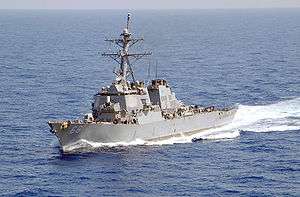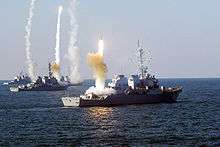USS The Sullivans (DDG-68)
 USS The Sullivans sailing through the Mediterranean Sea in July 2002. | |
| History | |
|---|---|
| Name: | USS The Sullivans |
| Namesake: | Sullivan brothers |
| Ordered: | 8 April 1992 |
| Builder: | Bath Iron Works |
| Laid down: | 27 July 1994 |
| Launched: | 12 August 1995 |
| Commissioned: | 19 April 1997 |
| Homeport: | NS Mayport, Florida, U.S. |
| Motto: | "We Stick Together"[1] |
| Status: | in active service |
| Badge: |
 |
| General characteristics | |
| Class and type: | Arleigh Burke-class destroyer |
| Displacement: |
|
| Length: | 505 ft (154 m) |
| Beam: | 66 ft (20 m) |
| Draft: | 31 ft (9.4 m) |
| Propulsion: | 4 General Electric LM2500-30 gas turbines, two shafts, 100,000 total shaft horsepower (75 MW) |
| Speed: | >30 knots (56 km/h) |
| Range: |
|
| Complement: | |
| Sensors and processing systems: |
|
| Electronic warfare & decoys: |
|
| Armament: |
|
| Aircraft carried: | 2 Sikorsky MH-60R helicopters can be embarked |
USS The Sullivans (DDG-68), an Arleigh Burke-class Aegis guided missile destroyer, is the second ship of the United States Navy to be named for the five Sullivan brothers — George, Francis, Joseph, Madison, and Albert Sullivan, aged 20 to 27 – who lost their lives when their ship, USS Juneau, was sunk by a Japanese submarine in November 1942 in the Naval Battle of Guadalcanal (the first ship named for them was USS The Sullivans (DD-537)). This was the greatest military loss by any one American family during World War II. In 2000 a group affiliated with Al-Qaeda attempted to attack and destroy The Sullivans, but the attackers' boat sank before the attack could be carried out.[2]
Construction
The contract to build The Sullivans was awarded to Bath Iron Works Corporation in Bath, Maine on 8 April 1992 and her keel was laid down on 27 July 1994. She was launched on 12 August 1995 sponsored by Kelly Ann Sullivan Loughren, granddaughter of Albert Sullivan. The ship was commissioned on 19 April 1997, with Commander Gerard D. Roncolato in command.[3][4][5] Upon her commissioning, the ship was given the motto that is thought to have been spoken by the brothers when asked to separate during World War II, "We Stick Together."
History

On 26 April 1997, The Sullivans departed New York City for Norfolk, Virginia, where, after arriving on 27 April, the crew completed underway replenishment qualifications with Platte. The warship then sailed for NS Mayport, Florida, on 29 April and arrived in her new homeport on 2 May.[5]
After completing two days of gunnery trials in mid-May, The Sullivans embarked upon her shakedown deployment to the West Indies on 27 May. That cruise took her to the waters off Puerto Rico and the U.S. Virgin Islands, where the destroyer conducted numerous sonar, gunnery, and torpedo exercises. The warship also twice entered Roosevelt Roads and stopped once at St. Thomas, U.S. Virgin Islands for port visits. On 29 June, The Sullivans conducted test firings of Standard SM-2 ER missiles from her vertical launch system (VLS). After a brief stop at Mayport for the 4 July weekend, the warship joined other Arleigh Burke-class destroyers, cruisers, destroyers, and frigates off the Virginia Capes for a multiple-ship missile firing exercise. She returned to Mayport on 12 July for upkeep.[5]
Following three days of damage control exercises in mid-August, the crew began preparations for a post shakedown availability. She sailed for Maine on 3 September, arriving at Bath Iron Works on 5 September. The shipyard repainted the hull, altered the superstructure, and installed equipment upgrades in the engineering plant and combat systems suite. When the yard work was completed The Sullivans got underway for Mayport, arriving there on 23 November.[5]
On 8 December the destroyer joined the aircraft carrier Enterprise off Georgia for a week of underway training. While providing plane guard services on 11 December, a T-45 Goshawk trainer splashed following take-off. The Sullivans made a high-speed dash to the site. While the carrier's rescue helicopter safely rescued the pilot, boats launched by The Sullivans picked up considerable pieces of wreckage which were helpful in determining the cause of the crash. The crew also completed helicopter deck landing qualifications before returning to port for the holidays on 12 December.[5]
In January 1998, the crew of The Sullivans began a series of exercises designed "to build the capability for long-term self-sustained training onboard." They included engineering, combat, seamanship, and battle scenario training exercises. These local operations lasted until 18 May when the warship got underway for New York City and the annual "Fleet Week" celebrations.[5]
Following a week-long port visit, The Sullivans got underway on 26 May for Halifax, Nova Scotia, to conduct training workups for the upcoming Exercise "Unified Spirit '98." During the exercise she joined an amphibious task force formed around USS Nassau, two Amphibious transport docks (LPDs), and two dock landing ships (LSDs). The warship screened the "gator" ships during an exercise focusing on multi-national peace enforcement operations. Ships from Canada, Great Britain, Germany, France, Norway, Denmark, Belgium, and Portugal also participated in the exercise. After this exercise, the ship visited Boston, Massachusetts, and then sailed with relatives and family for Mayport, arriving on 1 July.[5]
After a summer of conducting midshipmen training off the Florida coast, CDR Roncolato was relieved by CDR E. Scott Hebner, USN, in a change of command ceremony on 4 September 1998. The Sullivans was then assigned to Destroyer Squadron 24, a component of the John F. Kennedy Battle Group. In 1999 the ship participated in various training exercises to prepare for her maiden deployment in October to the Mediterranean Sea. Later in 2000 she continued into the Arabian Sea, participating in exercises and boarding operations until late March. On 9 February 2000, CDR Daniel Paul Keller USN relieved CDR Heber in a change of command ceremony held at sea on station in the Persian Gulf.[5]
After port visits in the Persian Gulf, The Sullivans returned through the Mediterranean Sea to her homeport in April 2000, successfully completing her first six-month deployment. After participating in BEACHFEST at Port Canaveral, Florida, The Sullivans underwent a major maintenance overhaul to prepare for future operations.[5]
While underway and sailing for Composite Unit Training Exercise[6] 01-2 The Sullivans received word of the September 11 attacks. The Sullivans, as part of the Kennedy Battle Group, took part in Operation Noble Eagle. The destroyer provided air-space security along the mid-Atlantic seaboard.[7]
In February 2002 The Sullivans deployed with the John F. Kennedy Carrier battle group to the Arabian Sea in support of Operation Enduring Freedom.[5]
On 20 March 2010 as the ship entered the harbor at Manama, Bahrain it struck a harbor buoy and sustained between $200,000 and $1 million in damage. The ship's captain, Commander Neil Funtanilla, was subsequently relieved of his command at an admiral's mast by Rear Admiral Phil Davidson, commander of Combined Task Force 50.[8]
On 17 August 2011, The Sullivans mistakenly fired on a fishing boat rather than a towed gunnery target during a gunnery exercise off North Carolina. As a result, Commander Mark Olson was relieved of his command. None of the inert shells hit the boat and there were no injuries as a result of the incident.[9]
On 7 May 2012, Commander Derick Armstrong was relieved of command after several female crew members alleged that he sexually harassed women aboard ship.[10][11]
On 18 August 2013, The Sullivans provided medical assistance to an ill mariner on board the merchant vessel MV Abir Alqaray No. 4, a Saudi Arabian-flagged dhow, off the coast of Saudi Arabia.[12]
On 18 July 2015, a RIM-67 Standard missile test fired from The Sullivans exploded just after launch. No injuries were reported but a small fire occurred on deck. Malfunctions of solid-fuel missiles in the U.S. Navy are extremely rare.[13]
Al-Qaeda bombing plot
Members of al-Qaeda attempted an attack on The Sullivans while in port at Aden, Yemen on 3 January 2000 as a part of the 2000 millennium attack plots. The plan was to load a boat full of explosives and explode near The Sullivans. However the boat was so overladen that it sank, forcing the attack to be abandoned. Later, al-Qaeda tried the same type of attack a second time, successfully bombing USS Cole on 12 October 2000.[14][15]
References
- ↑ Ship's Crest.
- ↑ Wright, Lawrence, The Looming Tower Vintage Books, 2006. pg. 339
- ↑ A New Navy Destroyer Honors Victims of a Wartime Tragedy at Sea The New York Times. McFadden. 20 April 1997.
- ↑ Naval Vessel Register. DDG-68.
- 1 2 3 4 5 6 7 8 9 10 DDG-68 History. via web archive dated February 2005.
- ↑ http://www.globalsecurity.org/military/ops/comptuex.htm
- ↑ http://www.history.navy.mil/danfs/j3/john_f_kennedy.htm
- ↑ Ewing, Phillip, "The Sullivans CO fired in wake of buoy strike", Military Times, 19 May 2010.
- ↑ Fellman, Sam, "Destroyer CO sacked after ship fired on boat", Navy Times, 7 September 2011.
- ↑ Report: Navy commander removed after sexual harassment claims, by Brock Vergakis, Associated Press, 20 August 2012
- ↑ Stewart, Joshua. "The Sullivans skipper relieved of command." Navy Times, 8 May 2012.
- ↑ Lt. j.g. Paul Moe, USN (4 September 2013). "USS The Sullivans Provides Assistance to Saudi Dhows". NNS130904-02. USS The Sullivans Public Affairs. Retrieved 2013-09-09.
- ↑ Destroyer USS The Sullivans Damaged After Missile Explodes After Launch, No Injuries Reported, Sam LaGrone, July 22, 2015
- ↑ Federal Bureau of Investigation (2004). "Terrorism 2000/2001 2004–306-694". www.fbi.gov. United States Government Printing Office. Retrieved 4 February 2015. (PDF version)
- ↑ Piszkiewicz, Dennis (2003). Terrorism's war with America : a history. Westport, Conn.: Praeger. p. 123. ISBN 0-275-97952-0.
- This article includes information collected from the Naval Vessel Register, which, as a U.S. government publication, is in the public domain. The entry can be found here.
External links
| Wikimedia Commons has media related to USS The Sullivans (DDG-68). |
- USS The Sullivans official website
- nvr.navy.mil: USS The Sullivans
- navsource.org: USS The Sullivans
- navysite.de: USS The Sullivans
- The Sullivan Brothers: History of USS The Sullivans (DDG-68)